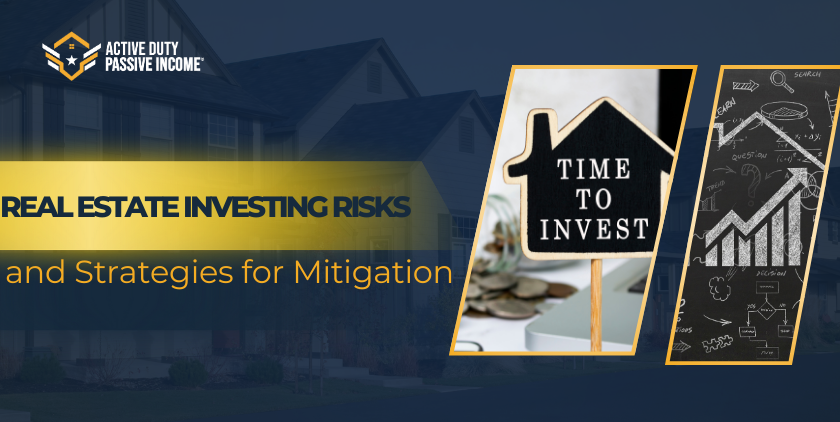Real estate investing has long been considered a lucrative avenue for wealth creation and financial stability. However, like any investment, it comes with its fair share of risks. Understanding these risks and implementing effective mitigation strategies is crucial for success in the real estate market. In this comprehensive guide, we’ll delve into the various risks associated with real estate investing and explore practical techniques to mitigate them, empowering both novice and seasoned investors to navigate the complexities of this dynamic industry.
Understanding Real Estate Investing Risks
- Market Fluctuations:
- Market fluctuations can significantly impact property values, rental income, and overall investment returns.
- Economic downturns, changes in interest rates, and shifts in supply and demand dynamics can all contribute to market volatility.
- Mitigation Strategy: Diversification across different markets and property types can help spread risk. Additionally, investing in stable, cash-flowing properties with long-term appreciation potential can provide resilience against market fluctuations.
- Vacancy and Tenant Turnover:
- Vacancy periods and tenant turnover can disrupt cash flow and increase holding costs for investors.
- Factors such as location, property condition, and market conditions can influence vacancy rates.
- Mitigation Strategy: Conduct thorough tenant screening to minimize the risk of leasing to unreliable tenants. Maintaining a proactive approach to property management and offering competitive rental rates can also help reduce vacancy and turnover rates.
- Property Damage and Maintenance Costs:
- Property damage due to natural disasters, accidents, or neglect can result in costly repairs and maintenance expenses.
- Regular upkeep is essential to preserving property value and attracting tenants.
- Mitigation Strategy: Invest in comprehensive insurance coverage to protect against property damage and liability risks. Implement preventive maintenance measures to address potential issues before they escalate, thereby minimizing repair costs and ensuring tenant satisfaction.
- Financing Risks:
- Reliance on leverage exposes investors to interest rate fluctuations, loan defaults, and foreclosure risks.
- Inadequate financing options or unfavorable loan terms can strain cash flow and impede investment performance.
- Mitigation Strategy: Conduct thorough due diligence when selecting financing options, considering factors such as interest rates, loan terms, and repayment flexibility. Maintaining sufficient cash reserves can also provide a buffer against unexpected financial challenges and mitigate the risks associated with leverage.
- Regulatory and Legal Risks:
- Real estate investments are subject to a myriad of regulatory requirements and legal complexities.
- Zoning restrictions, building codes, environmental regulations, and landlord-tenant laws can all impact investment decisions and operational procedures.
- Mitigation Strategy: Stay informed about local, state, and federal regulations governing real estate investments. Consult with legal professionals specializing in real estate law to ensure compliance and mitigate legal risks. Additionally, incorporating risk management protocols into property management practices can help preempt potential legal disputes and liabilities.
- Economic and Geopolitical Factors:
- Economic instability, geopolitical tensions, and global events can exert significant influence on real estate markets.
- Factors such as inflation, unemployment rates, and geopolitical conflicts can impact consumer confidence, investor sentiment, and property values.
- Mitigation Strategy: Stay attuned to macroeconomic indicators and geopolitical developments that could affect real estate markets. Diversify investment portfolios to hedge against geopolitical risks and economic uncertainties. Adopt a long-term investment horizon and avoid reactionary decision-making based on short-term market fluctuations.
Strategies for Mitigating Real Estate Investing Risks
- Conduct Comprehensive Due Diligence:
- Thoroughly research potential investment opportunities, analyzing factors such as market trends, property condition, rental demand, and comparable sales data.
- Evaluate the financial performance and operational history of prospective properties, scrutinizing income statements, expense reports, and rent rolls.
- Engage qualified professionals, such as real estate agents, appraisers, and inspectors, to provide expert insights and validate investment assumptions.
- Build a Resilient Portfolio:
- Diversify your real estate portfolio across different asset classes, geographic locations, and market segments to spread risk and optimize returns.
- Balance high-risk, high-reward investments with more conservative assets to maintain stability and mitigate volatility.
- Consider incorporating a mix of residential, commercial, and industrial properties to diversify income streams and hedge against sector-specific risks.
- Maintain Adequate Cash Reserves:
- Establish contingency funds to cover unforeseen expenses, such as property repairs, maintenance costs, and periods of vacancy.
- Maintain sufficient liquidity to withstand economic downturns, market disruptions, and unexpected financial challenges.
- Adopt a conservative approach to leverage, ensuring that debt obligations are manageable and aligned with cash flow projections.
- Implement Robust Risk Management Practices:
- Proactively identify and assess potential risks associated with each investment property, developing risk mitigation strategies tailored to specific circumstances.
- Regularly review and update insurance coverage to address evolving risks and safeguard against property damage, liability claims, and other unforeseen events.
- Cultivate strong relationships with property management professionals, contractors, and service providers to promptly address maintenance issues, mitigate operational risks, and uphold tenant satisfaction.
- Stay Informed and Adaptive:
- Remain vigilant in monitoring market trends, regulatory developments, and emerging risks that could impact real estate investments.
- Leverage technology, data analytics, and predictive modeling tools to enhance decision-making and identify opportunities for optimization and risk mitigation.
- Continuously educate yourself through networking, industry events, and professional development initiatives to stay abreast of best practices and innovative strategies in real estate investing.
Real estate investing offers unparalleled opportunities for wealth creation and financial security, but it is not without its inherent risks. By understanding the diverse array of risks facing real estate investors and implementing effective mitigation strategies, individuals can navigate the complexities of the market with confidence and resilience. Whether you’re a novice investor seeking to build a diversified portfolio or a seasoned professional looking to optimize returns, the key to success lies in proactive risk management, strategic decision-making, and a commitment to ongoing learning and adaptation in a dynamic and ever-evolving industry.
If you’re ready to get start on your real estate investing, join ADPI Campus, click the box below to learn more!









